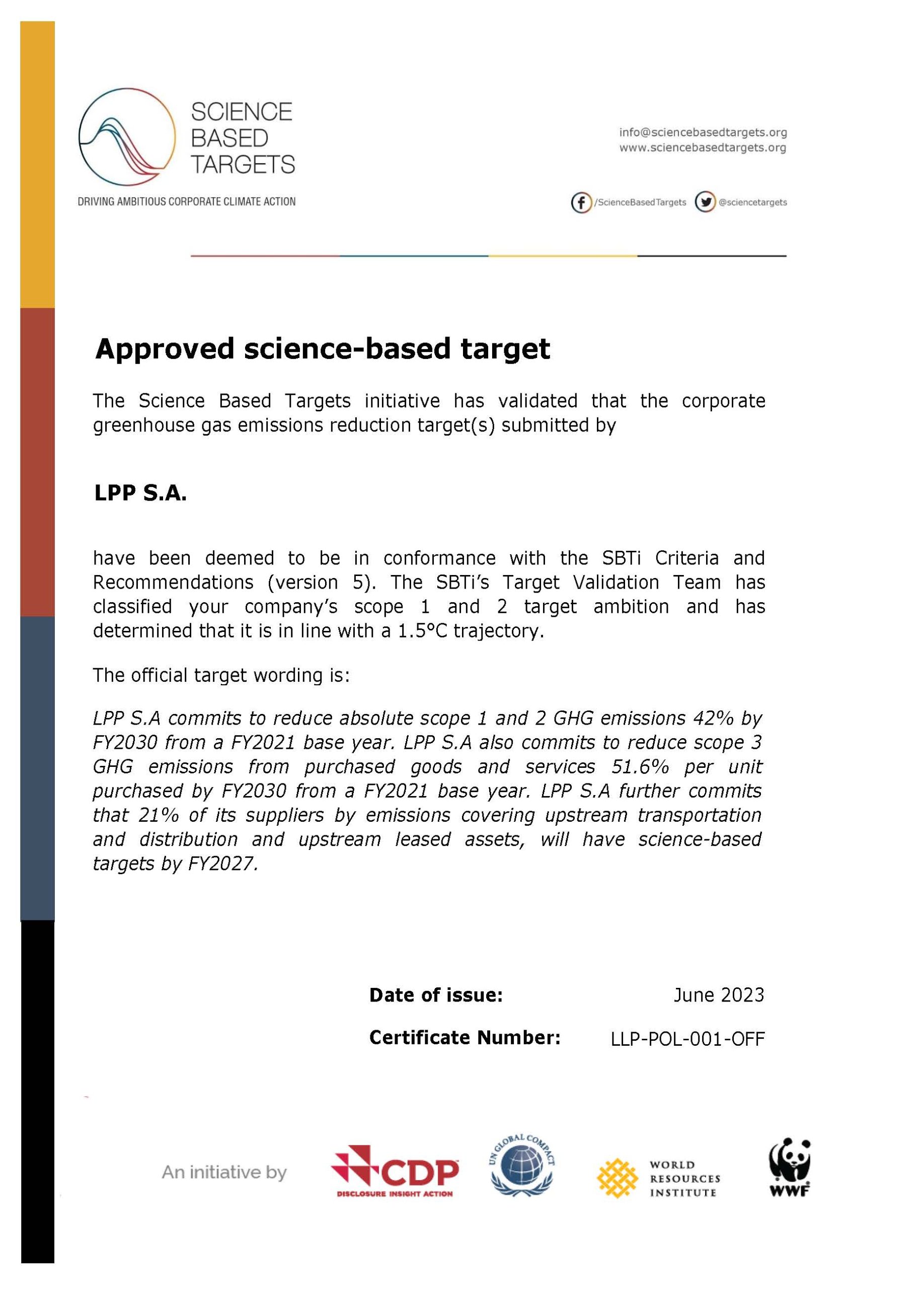LPP with decarbonisation plan approved by SBTi

LPP is the first Polish apparel company whose decarbonisation targets have been scientifically verified and validated by the international initiative Science Based Targets (SBTi). The company’s commitments comprise a plan to reduce greenhouse gas emissions by 2030 in the categories that are responsible for its carbon footprint to the most extent. The certification obtained by LPP confirms that the targets set by the company are in line with the Paris Agreement and are part of the efforts to halt the 1.5°C increase in global warming.
Actions aimed at limiting global warming require multifaceted cooperation between states, academia and business circles, and need to be translated into business development strategies and cross-sectoral collaborations. An example of a partnership supporting the private sector in reducing greenhouse gas emissions is the Science Based Targets (SBTi) initiative co-created by CDP, UN Global Compact, World Resources Institute and WWF, involving over 5,500 companies representing dozens of countries and economic sectors. LPP is the first Polish apparel company to join this group and subject its decarbonisation targets to scientific verification, thus realising the next step in reducing the environmental impact of its operations.
– The preparation of our decarbonisation plan and its positive evaluation by SBTi allowed us to re-examine the areas of our operations that produce the highest emissions and where the potential to reduce them is evident. We continue to expand our knowledge as regards our environmental impact and see more and more solutions to reduce our carbon footprint. However, we do realise that if we want to effectively reduce our environmental impact, we need the support of independent bodies that are able to verify whether our targets are realistic and scientifically sound, based on the current state of climate science. We still have a long way to go, but the obtained verification of the emission reduction plan gives us confidence that our strategy is based on strong foundations and that, as a company, we are heading in the right direction – comments Dorota Jankowska-Tomków, procurement and ESG director at LPP.
The starting point for the company’s emissions reduction efforts was the sustainability strategy adopted in 2019, which took into account all stages of the LPP business model. This was followed by the company’s first independent calculation of its total carbon footprint in 2021. The next step involved working out a decarbonisation plan, which was scientifically analysed by SBTi. The positive verification just obtained confirms that setting targets in the areas that most affect its emissions is likely to yield tangible results.
In the decarbonisation plan submitted to SBTi, LPP committed to:
- a 42% reduction in Scope 1 and 2 greenhouse gas emissions by 2030, compared to a baseline year of 2021. This will be achieved through, among other things, further decarbonisation of the power grid and transitioning to RES, reductions in energy consumption, as well as changes in the area of the company’s own vehicle fleet,
- a 51.6% reduction in emissions from the purchase of Scope 3 goods and services by 2030, per unit of product purchased (compared to 2021). In order to meet its commitments, the company will, among other things, increase the share of certified raw materials needed for production which exert less environmental impact, and increase its commitment to working with suppliers on the transition to renewable energy,
- involve business partners responsible for 21% of emissions in categories 4 and 8 of Scope 3 in developing their own reduction targets by 2027.

–Each company exerts a different impact on the environment, creating a unique carbon footprint that cannot be compared to others across the country, industry or even a similar business model. At LPP, we are aware that reducing emissions is not just a product-related issue, but one that concerns the entire value chain. Changes, for example in the area of reducing waste and single-use plastics in the sourcing and distribution network, influence our partners and set an example for other companies to act more sustainably. This works both ways. On our end, we also take inspiration from our suppliers investing in new technologies that reduce the environmental impact of production, or, for example, shipowners working with us who rely on fuels with a lower carbon footprint. We are convinced that by setting common targets we can make ambitious commitments – comments Dorota Jankowska-Tomków.
SBTi now brings together a significant part of global business open to publicly disclose their climate commitments – in line with the highest ambition of the Paris Agreement, and the methodology for calculating emissions recommended by SBTi is consistent with the GHG Protocol. As Tomasz Gasiński, Director of Sustainability Consulting Central Europe at Deloitte, confirms:
– Companies defining targets under the SBTi set them both for their own operations (in Scope 1 and 2) as well as for the key supply chain emissions of Scope 3. Especially in the latter area, current reports by climate scientists (IPCC) indicate the need for concerted action by both market leaders and actors in entire supply chains. It is important to remember that value chain leaders have the privilege of a strong market position, but it is also their responsibility to raise awareness and engage their supply chain to take transparent action to reduce emissions and ultimately limit climate change.
SBTi’s revision of decarbonisation targets is another important step to support LPP’s sustainability. By setting ambitious targets in this regard, not only is the company making further commitments, but also supporting the promotion of ESG issues awareness among employees and the company’s environment. This is how the project entitled “Z ESG na Ty” [“Get familiar with ESG”] originated. It introduces a seemingly complex subject in an accessible way. In the first edition of the series, Ewa Janczukowicz-Cichosz, sustainability expert, and Aleksandra Kędziora, senior sustainability specialist from LPP, discuss SBTi, decarbonisation and greenhouse gas emissions. That and subsequent episodes will be presented on the internal communication platform, and are planned to be posted on the social media of the Gdańsk-based company.
____________________________________
LPP is a Polish family business and one of the fastest growing clothing companies in the region of Central and Eastern Europe. For 30 years, it has been successfully operating in Poland and abroad, offering its collections in such prestigious capitals as London, Helsinki or Tel Aviv. LPP SA manages five fashion brands: Reserved, Cropp, House, Mohito, and Sinsay, whose offer is available today in stationary and online stores in nearly 40 markets worldwide. The company has a chain of over 2000 stores with the total area of 1.7 million m2 and distributes clothing and accessories to 3 continents every year. LPP plays another important role as it employs nearly 30 thousand people in its offices and sales structures in Poland, Europe, Asia, and Africa. The company is listed on the Warsaw Stock Exchange in the WIG20 index and belongs to the prestigious MSCI Poland index.

